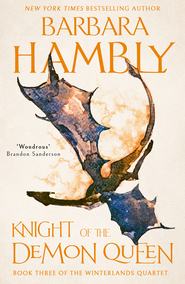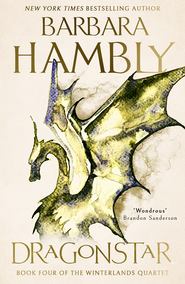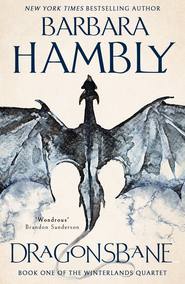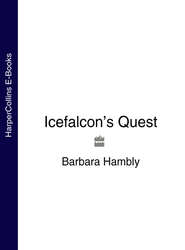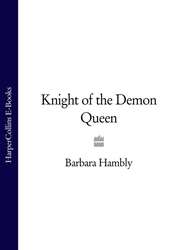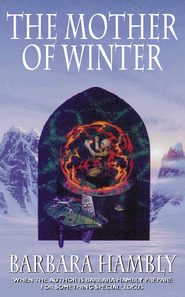По всем вопросам обращайтесь на: info@litportal.ru
(©) 2003-2025.
✖
Dragonshadow
Автор
Год написания книги
2019
Настройки чтения
Размер шрифта
Высота строк
Поля
But this was something that had to be done.
Crossing the moat was easy. The bandits had been heaving rocks and dirt, broken trees and beams into it for weeks to provide their scaling ladders with footing. As she came under the trees of the woods that drew close to the wall at this point, she passed between two watchers, a woman and a man, ugly leathery brutes crouched like wolves waiting beside water for prey. Even if she had not been mageborn, she thought she would have been able to smell them in the dark. She’d walked one night to the edge of Balgodorus’ camp, perhaps a mile and a half down the rough-sloping ground. Seen the shimmer of ward-sigils and elf-light that fenced the place, guarding it as her own guarded Palmorgin’s walls.
The clearing she sought tonight was half a mile from the bandit camp and long known to her. An ash tree stood in it, ruinously old, the sole survivor of some long-ago fire. The rock by which it grew could have been a natural one, unless you looked at it from a certain angle and realized it had been hewn into the shape of a crouching pig. There was a hollow in the top that collected dew. Around this hollow Jenny traced a circle with her fingers, her eyes slipping half-closed.
She formed in her heart the power of the moon, when it should lie one day closer to its dying than it lay tonight. The turning stars, white and cold and ancient. With her fingers she braided the moonlight, slippery-cold as heavy silk, and with a little spoon of crystal and silver drawn from her pocket she dipped up dew from the grass. Spiderweb and milkweed she bound into the spells and brushed them with the spoon-back into the air again: a whispering of longing and of pain. With the shadows of her hair she painted runes into the darkness, and from the pale starflash made sigils of pallid light.
Her knee braced on the rock, she slipped the harp free of its casing: balanced it in her arm as she had balanced her children when they were babies. There were barely strings for her two hands. The spells she wove she had learned from the Dragon of Nast Wall, and scarcely knew what emotion she wove into tomorrow’s moonlight, tomorrow’s stars, as she had woven it last night into the slant of tonight’s milky shadows.
Hunger for what was gone forever. Heart-tearing sweetness glowing in the core of a bitter fruit. A hand curved around the illusion of fire or a jewel; books hidden long in the earth.
For two weeks she had come, while the silver coin of the moon swelled to fullness, then was clipped away bit by bit: the Gray God covering over with his sleeve the white paper he wrote on, they said, that men could not read what would work their ruin. For two weeks she had made this song of dreams of grief. Then in the silence that followed the song she waited.
Far off to her right one of the watchers around the manor swatted a gnat and cursed.
The stars moved. The moon rode high, singing its triumph. Bones and body ached. Moreover, the grief of the spell, as is the way of spells without words, was her own. Thin mists no higher than Jenny’s knees stirred among the trees, and in time she smelled the change in the air that spoke of dawn.
She drew a mist about herself, and the changeable illusion of dreams. Like a deer wrought of glass, she picked her way back through thickets and dew-soaked ferns, through the dell where fey-lights danced among the mushrooms and the ringed stones. Those who crouched on picket, squinting across open ground to the new stone walls, the trash-filled moat and ruined outbuildings, didn’t see her when she paused between them, looking at Pellanor’s Hold.
A rough square of stone walls, perhaps sixty yards to the side, floating in a milky drift of mist. Turrets at each corner and a blockhouse on the west. Gate and gatehouse. Stables and granaries. Three hundred and fifty people—men, women, and children …
A gift, as Balgodorus would see it, of good southern weaponry and steel, of slaves for the selling and grain to feed his troops. And Jenny herself, a mageborn weapon in the Law’s hand.
As this girl, whoever she was, was Black-Knife’s weapon.
And against that she saw the burned-out havoc of Cair Dhû; Adric huddled alone among the sheepskins of the big curtained bed he and his brother shared. John in his study with his spectacles in his hand, reading one passage over and over, two times, three times, in the light of the candles, and then slowly leaning his forehead down on his hand.
She closed her eyes. She had only to whistle up Moon Horse and ride.
That fleck of light on the parapet would be Pellanor, waiting for her sign below to let down the rope.
Dawn rinsed the blackness over the walls with the thinnest pallor of gray.
Jenny sighed and wrapped invisibility around her. Like a shred of mist she moved among the ruins of the village, past the bandit watchers, to the beleaguered Hold once more.
SEVEN (#ulink_cf5e428b-fbfe-5a64-a078-75fc960cb9ef)
“MAGGOTS FROM MEAT, weevils from rye.
Dragons from stars in an empty sky.”
John Aversin sat for a long time with the second volume of The Encyclopedia of Everything in the Material World open before him:
“Dragons come down out of the north, being formed in the hearts of the volcanoes that erupt in the ice. The combination of the heat and the cold, and the vapors from under the earth, give birth to eggs, and the eggs so to the dragons themselves. Being born not of flesh, they are invulnerable to all usages of the flesh …”
Among the green curlicues, gold-leaf flowers, and carmine berries of the marginalia could be found enlightening illuminations of perfectly conical mountains spitting forth orange dragon eggs as if they were melon seeds, accompanied by drawings of hugely grinning and rather crocodilian dragons.
“Teltrevir, heliotrope,” whispered Jenny’s voice in his mind and behind it the braided threads of music from her harp, the tunes that were joined to those names. “Centhwevir is blue knotted with gold. Nymr sea-blue, violet-crowned; Gwedthion ocean-green and Glammring Gold-Horns bright as emeralds …”
And each tune, each air, separate and alien and haunting. John closed his eyes, exhaustion grinding at his flesh, and remembered a round-dance he’d seen as a child. Its music had been spun from the twelfth of those nameless passages. The twelfth name on Jenny’s list was Sandroving, gold and crimson. The girls had called the dance Bloodsnake. He could still whistle the tune.
Dotys had more to say. “The star-drakes, or dragons as such things are called, dwelt anciently in the archipelagoes of rock and ice that string the northern seas westward from the Peninsula of Tralchet, islands called by the gnomes the Skerries of Light. These skerries, or reefs, of rock are utterly barren, and so the dragons must descend to the lands of men to hunt, for they are creatures of voracious appetite, as well as archetypes of greed and lust and all manner of willfulness.”
And they live on what between times? thought John.
On the corner of his desk Skinny Kitty woke long enough to scratch her ear and wash, then returned to sleep with her paw over her nose. In the cinder darkness beyond the window a cock crowed.
He touched the sheaf of parchment that the young Regent had sent him. The old ballads had been copied in beautiful bookhand by a court scribe. It was astonishing what coming to power could do for obsessions previously sneered at by the fashionable.
“‘For lo,’she quoth, ‘do dragons sing
More beautifully than birds.’”
Who in their right mind would, or could, make up a detail like that?
“Southward-flying shadows of fire.”
“From isles of ice and rock beneath the moon.”
A candle guttered, smoking. John looked up in surprise and groped around until he found a pair of candle scissors to trim the wick. The sky in the stone window frame had gone from cinder to mother-of-pearl.
His body hurt, as if he’d been beaten with lengths of chain. Even the effort of sitting up for several hours made his breath short. Most of the candles had burned out, and their smutted light stirred uneasily in the networks of experimental pulleys and tackle that hung from the rafters. It would soon be time to go.
“… isles of ice and rock …”
The other volume lay in front of him also. The partial volume of Juronal he had found in a ghoul’s hive, near what had been the Tombs of Ghrai; the volume he had read on his return, two nights ago, as he searched for that half-remembered bit of information that told him what had become of Ian and why he could wait no longer to embark on his quest for help.
North, he thought. He took off his spectacles and leaned his forehead on his hand. Alone. God help me.
The key to magic is magic! Jenny flinched away from the hard knobbed hands striking her, the toothless mouth shouting abuse. The dirty, smoky stink of the house on Frost Fell returned to her through the dream’s haze. Caerdinn’s cats watched from the windowsills and doors, untroubled by the familiar scene. The key to magic is magic! The old man’s grip like iron, he dragged her from the hearth by her hair, pulled the old harp from her hands, thrust her at the desk where the books lay, black lettering nearly invisible on the tobacco-colored pages.
The more you do, the more you’ll be able to do! It’s laziness, laziness, laziness that keeps you small!
It isn’t true! She wanted to shout back at him, across all those years of life. It isn’t true.
But at fourteen she hadn’t known that. At thirty-nine she hadn’t known.
In her dream she saw the summer twilight, the beauty of the nights when the sky held light until nearly midnight and breathed dawn again barely three hours later. In her dream she heard the sad little tunes she’d played on her master’s harp, tunes that had nothing to do with the ancient music-spells handed down along the Line of Herne. Like all of Caerdinn’s knowledge, those spells of music were maddeningly ambiguous, fragments of airs learned by rote.
In her dream Jenny thought she saw the black skeletal shape of a dragon flying before the ripe summer moon.
The key to magic was not magic.
Out of darkness burned two crystalline silver lamps. Stars that drank in the soul and tangled the mind in mazes of still-deeper dream. A white core of words forming in fathomless darkness.
What is truth, Wizard-woman? The truth that dragons see is not pleasant to the human eyes, however uncomfortably comprehensible it may be to their hearts. You know this.
The knots of colored music that were his true name.






